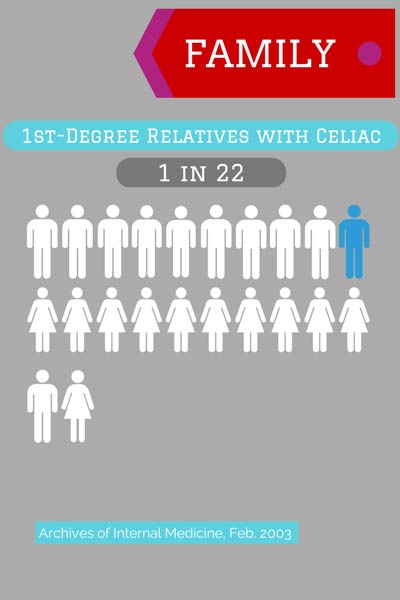 Whether you have a history of celiac in your family or one new diagnosis that seemingly came from out of the blue, you need to convince your family members to get tested!
Whether you have a history of celiac in your family or one new diagnosis that seemingly came from out of the blue, you need to convince your family members to get tested!
What is “getting tested” for celiac?
Getting tested means doing blood or serological testing. You must be on a gluten-containing diet in order for these test results to be as accurate as possible.
Here is how the Celiac Disease Foundation describes the screening, “A simple blood test is available to screen for celiac disease antibodies. People with celiac disease who eat gluten have higher than normal levels of these antibodies in their blood.” It says the tTG-IgA test is the most sensitive and most common test used. For more information on the blood test, click here. It usually takes a few days to a week to get these results back.
If you test positive, then a doctor will recommend seeing a gastroenterologist who will then suggest the gold standard test: endoscopy and biopsy of the small intestine. This is more invasive, but it is important to get a baseline on record.
5 reasons for family to get tested for celiac
5. You might get a celiac diagnosis even though you had no idea you had it! Yes! 40% of adults and 60% of children with celiac didn’t have symptoms before diagnosis! Celiac Disease Facts and Figures, Univ. of Chicago Celiac Disease Center
4. Help understand your health history of your family. Maybe you don’t have celiac, but you carry the gene. Your child or grandchild could get it.
3. If you have undiagnosed celiac, the longer you go without a celiac diagnosis, the higher the chance of getting another autoimmune disorder. If you are diagnosed between the ages of 4 and 12 years old, you have 16.7% increased chance of getting another autoimmune disorder. If you are diagnosed between the ages of 12-20 years old you are at a 27% higher risk of getting another autoimmune disorder. And that number goes up to 34% if you are diagnosed over the age of 20. Celiac Disease Facts and Figures, Univ. of Chicago Celiac Disease Center
2. Because it is in your family, you have a higher risk of getting celiac. A new study reported late last month from BMCGastroenterology, followed first degree relatives (brothers, sisters, parents, sons, daughters) to see if they developed celiac. The initial group of 450 people between the years 2000 and 2010, 19 (or 4.2%) had biopsy proven celiac. Of that group, 205 patients who originally had negative serology agreed to a second test between 2010 and 2012. Another 8 now tested positive. Five had the biopsy and confirmed their celiac diagnosis.
Please read this great example of how a family can be impacted by celiac which was written up in the BMC study:
“Also of interest is that two of the new cases…were members of the same Family of 16 in which, out of the 11 members that could be retested, five were biopsy-proven celiac, 10 were carriers of predisposing HLA alleles and only one was serologically and DQ2/DQ8 [gene test] negative. This confirms the known fact that members of families with multiple cases are at higher risk of developing the disease.” — Findings from Screening for celiac disease in 1st degree relatives: a 10-year follow-up study, BMCGastroenterology February 20, 2014
From a 2003 celiac prevalence study published in the Archives of Internal Medicine, 1 in 22 first degree relatives have celiac. 1 in 39 for second degree relatives (uncles, aunts, grandparents).
1. Celiac has more than 300 symptoms! Just because you may not have the exact symptoms your daughter or father had doesn’t mean it’s not celiac.
The bottom line here is the earlier you get your diagnosis the better off you’ll be both immediately healthwise (you might not feel so crummy) and hopefully preventing further complications like another autoimmune disorder, osteoporosis, infertility or cancer in the future.
In my family alone, if I am just with my parents and my brother — the nuclear family I grew up with — half of them celiac disease! In my own family 1 in 4 has celiac. I am the carrier, but don’t have celiac. I am living with this dilemma too. My youngest daughter and I get tested every two years.
It is time. Don’t be fearful! This is a very treatable disease that is better to know about than ignore. Please forward this post on to your family members to educate and empower them to better health.
Tags: biopsy, blood, celiac, diagnosis, disease, gluten-free, symptoms, test



Leave a Reply